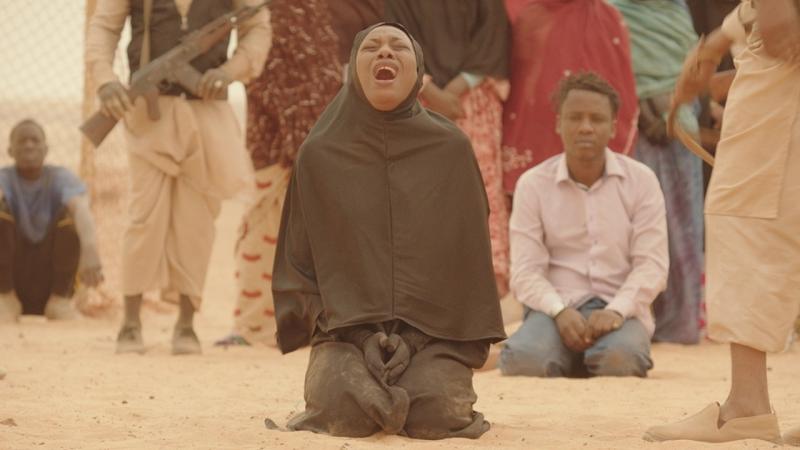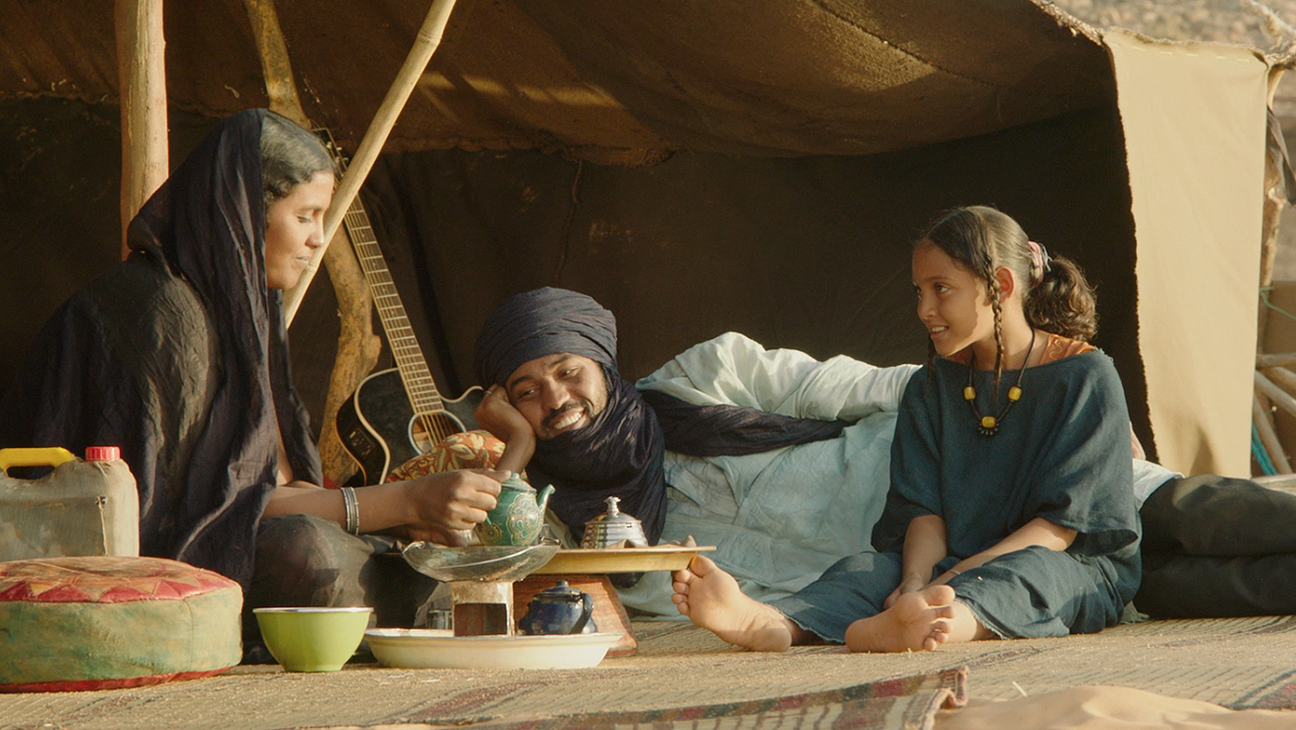Timbuktu | reviews, news & interviews
Timbuktu
Timbuktu
Quietly powerful, justly Oscar-nominated drama from Abderrahmane Sissako

The imposition of a brutal jihadist regime is relayed with formidable articulacy and a surprising lightness of touch in this gut-wrenching drama from Mauritanian director Abderrahmane Sissako. Although its narrative events are as horrifying as those of any thriller Timbuktu avoids the manipulative tricks of genre cinema.
Inspired by the Islamic militant occupation of Timbuktu in 2012 and by the stoning of an unmarried couple in Aguelhok the same year, it sees the titular city invaded by fundamentalists who introduce sharia law - banning football, smoking, music and forcing women to at first wear veils, then gloves and socks, with the escalating restrictions delivered by loudhailer. Our hero Kidane (Ibrahim Ahmed, pictured below right with his screen family) is a cattle-herder living a blissfully happy existence with his loving wife Satima (Toulou Kiki) and spirited 12-year-old daughter Toya (Layla Walet Mohamed). The shattering of their peace is an inevitability, for their desert encampment sits perilously close to the centre of the storm.
Timbuktu is a terrifically thoughtful film that gets to the heart of the matter. The community are predominantly shown as god-fearing Muslims, with the terror that's brought down upon them due to the fact that they are simply perceived to be the wrong kind of believers by people who seem to be making up the rules as they go along, and who are clearly using religious extremism to take what they want.
 The local imam (Adel Mahmoud Cherif) tries to calmly reason with these gun-toting intruders, acting as an intermediary between the unhappy inhabitants and their new rulers, while the distressed residents bravely resist with small but significant acts of insubordination: a fish-seller for whom it's impractical to wear gloves frustratedly offers her hands up to be cut; a madwoman cheerfully brands a group of militants "assholes"; and a mother refuses to marry her daughter to a stranger. As that suggests, female courage is placed right at the fore.
The local imam (Adel Mahmoud Cherif) tries to calmly reason with these gun-toting intruders, acting as an intermediary between the unhappy inhabitants and their new rulers, while the distressed residents bravely resist with small but significant acts of insubordination: a fish-seller for whom it's impractical to wear gloves frustratedly offers her hands up to be cut; a madwoman cheerfully brands a group of militants "assholes"; and a mother refuses to marry her daughter to a stranger. As that suggests, female courage is placed right at the fore.
What's also brought into sharp focus in this remarkable effort are the contradictions and sheer ordinariness of their oppressors. Despite the prohibitions they've imposed on others, the soldiers smoke on the sly, enthusiastically discuss football, and are far from certain when attempting to justify their actions or speak passionately about their way of life. Men patrol the city by night looking and listening for transgressions but are thrown into a quandary when the forbidden music they hear turns out to be an act of worship. "They're singing praise to the Lord and his prophet," a member of the militia reports to his superior. "Shall we arrest them?"
Told with exquisite subtlety and sensitivity, Timbuktu carefully weighs up the factors at play and human cost, never losing sight of the incredible strength of those who defy violent men, as well as all that is lost in a climate of intolerance and repression. It's a film that refuses to be defined by the darkness of the subject matter, that's utterly compelling in its presentation of those who stand as proud and resolute as desert trees, however bleak the future might seem.
The future of Arts Journalism
You can stop theartsdesk.com closing!
We urgently need financing to survive. Our fundraising drive has thus far raised £49,000 but we need to reach £100,000 or we will be forced to close. Please contribute here: https://gofund.me/c3f6033d
And if you can forward this information to anyone who might assist, we’d be grateful.

Subscribe to theartsdesk.com
Thank you for continuing to read our work on theartsdesk.com. For unlimited access to every article in its entirety, including our archive of more than 15,000 pieces, we're asking for £5 per month or £40 per year. We feel it's a very good deal, and hope you do too.
To take a subscription now simply click here.
And if you're looking for that extra gift for a friend or family member, why not treat them to a theartsdesk.com gift subscription?
more Film
 London Film Festival 2025 - a Korean masterclass in black comedy and a Camus classic effectively realised
New films from Park Chan-wook, Gianfranco Rosi, François Ozon, Ildikó Enyedi and more
London Film Festival 2025 - a Korean masterclass in black comedy and a Camus classic effectively realised
New films from Park Chan-wook, Gianfranco Rosi, François Ozon, Ildikó Enyedi and more
 After the Hunt review - muddled #MeToo provocation
Julia Roberts excels despite misfiring drama
After the Hunt review - muddled #MeToo provocation
Julia Roberts excels despite misfiring drama
 London Film Festival 2025 - Bradley Cooper channels John Bishop, the Boss goes to Nebraska, and a French pandemic
... not to mention Kristen Stewart's directing debut and a punchy prison drama
London Film Festival 2025 - Bradley Cooper channels John Bishop, the Boss goes to Nebraska, and a French pandemic
... not to mention Kristen Stewart's directing debut and a punchy prison drama
 Ballad of a Small Player review - Colin Farrell's all in as a gambler down on his luck
Conclave director Edward Berger swaps the Vatican for Asia's sin city
Ballad of a Small Player review - Colin Farrell's all in as a gambler down on his luck
Conclave director Edward Berger swaps the Vatican for Asia's sin city
 London Film Festival 2025 - from paranoia in Brazil and Iran, to light relief in New York and Tuscany
'Jay Kelly' disappoints, 'It Was Just an Accident' doesn't
London Film Festival 2025 - from paranoia in Brazil and Iran, to light relief in New York and Tuscany
'Jay Kelly' disappoints, 'It Was Just an Accident' doesn't
 Iron Ladies review - working-class heroines of the Miners' Strike
Documentary salutes the staunch women who fought Thatcher's pit closures
Iron Ladies review - working-class heroines of the Miners' Strike
Documentary salutes the staunch women who fought Thatcher's pit closures
 Blu-ray: The Man in the White Suit
Ealing Studios' prescient black comedy, as sharp as ever
Blu-ray: The Man in the White Suit
Ealing Studios' prescient black comedy, as sharp as ever
 The Woman in Cabin 10 review - Scandi noir meets Agatha Christie on a superyacht
Reason goes overboard on a seagoing mystery thriller
The Woman in Cabin 10 review - Scandi noir meets Agatha Christie on a superyacht
Reason goes overboard on a seagoing mystery thriller
 London Film Festival 2025 - crime, punishment, pop stars and shrinks
Daniel Craig investigates, Jodie Foster speaks French and Colin Farrell has a gambling habit
London Film Festival 2025 - crime, punishment, pop stars and shrinks
Daniel Craig investigates, Jodie Foster speaks French and Colin Farrell has a gambling habit
 I Swear review - taking stock of Tourette's
A sharp and moving tale of cuss-words and tics
I Swear review - taking stock of Tourette's
A sharp and moving tale of cuss-words and tics
 A House of Dynamite review - the final countdown
Kathryn Bigelow's cautionary tale sets the nuclear clock ticking again
A House of Dynamite review - the final countdown
Kathryn Bigelow's cautionary tale sets the nuclear clock ticking again

Add comment